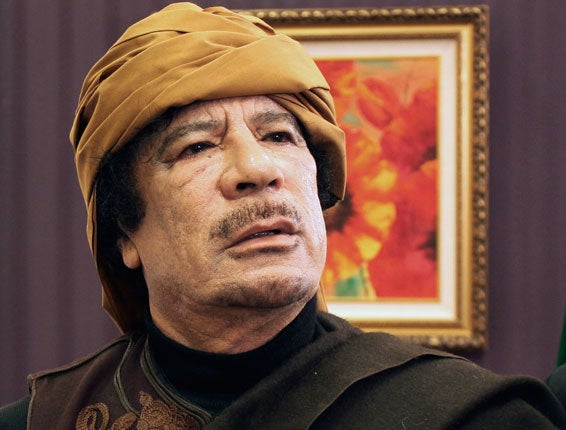Libya dismisses arrest warrants for Gaddafi and lieutenants

Your support helps us to tell the story
From reproductive rights to climate change to Big Tech, The Independent is on the ground when the story is developing. Whether it's investigating the financials of Elon Musk's pro-Trump PAC or producing our latest documentary, 'The A Word', which shines a light on the American women fighting for reproductive rights, we know how important it is to parse out the facts from the messaging.
At such a critical moment in US history, we need reporters on the ground. Your donation allows us to keep sending journalists to speak to both sides of the story.
The Independent is trusted by Americans across the entire political spectrum. And unlike many other quality news outlets, we choose not to lock Americans out of our reporting and analysis with paywalls. We believe quality journalism should be available to everyone, paid for by those who can afford it.
Your support makes all the difference.The International Criminal Court has ramped up the pressure on Libyan leader Colonel Muammar Gaddafi by issuing a warrant for his arrest, accusing him of mass murder of his opponents.
The ICC also called for the arrest of Saif al-Islam Gaddafi, the oldest son of the Libyan leader, described by the court as the "de facto prime minister", and Abdullah al-Senussi, the feared security chief, saying that there were "reasonable grounds" to believe the three were responsible for a plan to "deter and quell by all means" the civilian demonstrations against Col Gaddafi's 41-year rule in February.
The Libyan Justice Minister, Mohammed al-Qamoodi, dismissed the move last night, saying Libya rejected the authority of the tribunal. "Libya ... does not accept the decisions of the ICC which is a tool of the Western world to prosecute leaders in the Third World," he told a news conference in Tripoli.
"The leader of the revolution and his son do not hold any official position in the Libyan government and therefore they have no connection to the claims of the ICC against them," he added.
Although it remains unclear how the ICC, which has no police force at its disposal, will enforce the warrants, many hope the move will deepen the isolation of the Libyan leader, hastening his departure. Others fear the court's move will convince Col Gaddafi and his closest associates that they have nothing to lose by clinging on to power if they might otherwise face prosecution by going into voluntary exile.
The decision by the ICC, headquartered in The Hague, is the conclusion of a process started by the United Nations in March. ICC prosecutor Luis Moreno-Ocampo, who had sought the arrest warrants, said they were essential "to prevent them covering up ongoing crimes and ongoing new crimes".
Col Gaddafi has defied calls to step down, and his officials accused the ICC of spearheading a campaign against African leaders while ignoring what they said were crimes committed by Nato in Afghanistan, Iraq "and in Libya now", according to government spokesperson Moussa Ibrahim.
The ICC, set up in 2002, has enjoyed mixed success. It has charged one other sitting head of state, twice issuing arrest warrants for Sudanese President Omar al-Bashir on counts of genocide and crimes against humanity, but the African leader remains free.
William Hague welcomed the move, and warned that other regime officials could face a similar fate if they continued to cooperate in attacks on civilians. "The warrants further demonstrate why Gaddafi has lost all legitimacy and why he should go immediately. His forces continue to attack Libyans without mercy and this must stop," the Foreign Secretary said.
Mr Moreno-Ocampo said in his submission to the court that Col Gaddafi had personally planned "a policy of widespread and systematic attacks against civilians" and that his plan "expressly included the use of lethal force against demonstrators".
In Benghazi, the eastern city that fell to rebels after fighting in February, residents said the warrant ruled out the possibility for Col Gaddafi to talk his way out the conflict. Rebel council spokesman Jalal al-Galal said: "We cannot negotiate with war criminals. The world has confirmed what we have been saying all along. He's a war criminal and he should be tried for it."
The rebels remain the best chance of arresting Col Gaddafi, but they have made only limited gains towards the capital, Tripoli.
Join our commenting forum
Join thought-provoking conversations, follow other Independent readers and see their replies
Comments